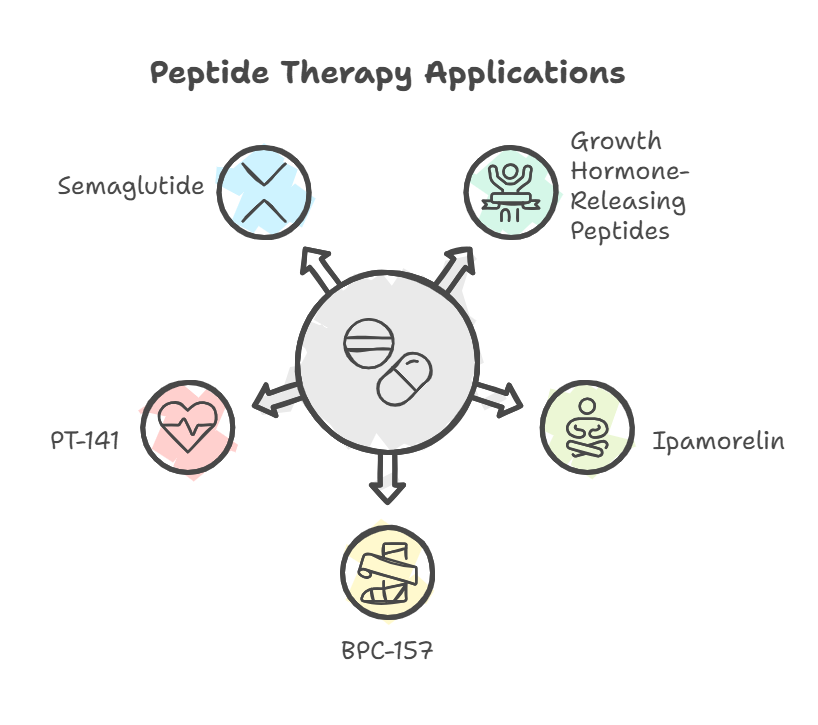Peptides are having a moment. Peptide therapy is making waves in many fields. It boosts skincare, sports performance, and wellness. But what exactly is peptide therapy, and why is it gaining so much attention?
This article explores the science of injectable peptides. It explains what they are, how they work in the body, and their potential benefits.
Peptides might improve skin elasticity, speed muscle recovery, or fight aging. But, there are risks to consider.
What is Peptide Therapy
Peptide therapy uses injectable peptides. They are small chains of amino acids. The therapy influences specific biological functions in the body. Amino acids are the building blocks of proteins.
Peptides act as messengers, affecting everything from hormone production to muscle growth. Peptide drugs have shown promise for a wide range of medical conditions.
How Does Peptide Therapy Work
Peptides bind to receptors on cells, starting a chain reaction of effects. They can act as agonists, copying the actions of natural hormones or neurotransmitters. They can also act as antagonists, stopping their activity.
The specific peptide and its target trigger a variety of changes in the body. Peptide therapeutics hold potential for addressing diverse health needs.
Consider exploring therapeutic peptides and their impact on historical perspectives and development trends. Learn about the latest work on synthetic peptides. They can fight bacteria and improve health1.
Peptides may affect blood sugar, blood pressure, and testosterone levels. They might also affect hair loss, bone loss, IBS, and MS. Additionally, peptides are often considered in testosterone replacement therapy (TRT), as they can potentially stimulate natural testosterone production or complement hormone optimization strategies.
IV therapy, when combined with injectable peptides, may enhance absorption and effectiveness, helping to deliver vital nutrients and peptides directly into the bloodstream for more immediate and targeted benefits.
Different Types of Peptides and Their Uses
Peptide injection therapy includes many different injectable peptides with varying uses. This section looks closer at some specific types. Understanding their distinct characteristics can guide your peptide treatments plan. If you are looking for peptide treatments, google “peptide injections near me” to find the best solution for you.

Growth Hormone-Releasing Peptides (GHRPs)
GHRPs like Sermorelin encourage the body to create more growth hormone. Athletes sometimes utilize GHRPs to enhance athletic performance and recovery.
This matches the trend of using certain peptides to enhance muscle and function. Growth hormone-releasing injectable peptides are instrumental in these processes2.
Ipamorelin
Ipamorelin, similar to GHRPs, increases growth hormone secretion, potentially with reduced side effects. Research continues to explore its specific effects and applications.
It’s being explored for its benefits regarding chronic pain and overall wellness as well.
BPC 157 Peptide Therapy
Peptide treatments BPC7 has shown promise for its potential regenerative properties, particularly in promoting joint health and aiding in the repair of injuries3.
Studies also highlight its potential in managing conditions like irritable bowel syndrome, making it an intriguing option for those seeking natural ways to support healing and recovery.
While reading up on this, I came across something online that caught my attention—a supplement that simplifies getting the potential benefits of BPC-157 without the hassle.
These BPC-157 peptide capsules are easy to take and specifically formulated to support joint health and overall well-being. If you’re curious like I was, it’s worth checking out to see if it aligns with what you’re looking for.
PT-141 (Bremelanotide)
Initially a tanning agent, PT-141 gained recognition for its potential impacts on libido and erectile dysfunction. Its potential role in addressing skin barrier function is another area of research.
Semaglutide
This GLP-1 receptor agonist was originally for diabetes treatment. Semaglutide influences hunger regulation, which may aid weight management.
This characteristic is part of how some researchers use injectable peptides for weight loss.
What to Expect During Peptide Therapy
If you’re thinking of peptide injection therapy, consult a qualified expert. They should have experience with peptide and human growth hormone therapies. They can assess your individual health needs.
A healthcare provider will choose the best peptide type, dose, and schedule. They’ll explain different treatment plans and expected outcomes.
Benefits of Peptide Therapy
Peptides have several potential benefits, including fine-tuning bodily functions.
Hormone Regulation and Replacement
Peptides are key to hormone replacement therapy (HRT). They help restore and balance hormones naturally. For example, growth hormone-releasing peptides (GHRPs) boost human growth hormone (HGH). HGH improves energy, metabolism, and muscle tone4.
Skin Health and Anti-Aging
Peptides are popular in skin care. They boost collagen, improve elasticity, and reduce wrinkles. Copper peptides, for instance, promote skin healing, repair, and rejuvenation.
Hair Loss Treatment
Some peptides, like Thymosin Beta-4, can regrow hair and improve scalp health. These peptides boost hair follicle growth and reduce inflammation. This may prevent hair loss.
Weight Management and Metabolism
Peptides like Semaglutide and Liraglutide manage diabetes and aid weight loss. They do this by controlling appetite and improving insulin sensitivity. Learn more about achieving balance in our guide on how to control hormones. By targeting key hormonal pathways, these injectable peptides offer an effective approach to managing obesity and related conditions.
Immune System Support
Thymosin Alpha-1 is a peptide that enhances immune function by modulating T-cell activity. It is often used in managing chronic infections or improving overall immunity5.
Cognitive and Mental Health Benefits
Peptides like Selank and Cerebrolysin boost brain health. They reduce anxiety, enhance memory, and protect the brain. Researchers are studying these neuropeptides. They may help manage Alzheimer’s and depression.
Improved Recovery and Healing
Peptides such as BPC-157 and TB-500 aid in tissue repair and recovery from injuries. They help cells regenerate, reduce inflammation, and heal ligaments, tendons, and muscles faster.
Cardiovascular Health
Some peptides help lower blood pressure and cholesterol. They improve heart health. For example, doctors use B-type natriuretic peptides (BNPs) to manage heart failure. They improve blood vessel function and reduce fluid retention.
Athletic Performance and Muscle Growth
Peptide treatments are popular in the fitness community for enhancing athletic performance. They aid in muscle building, fat loss, and faster recovery. Examples include growth hormone secretagogues (GHSs) like Ipamorelin and CJC-1295.
Gastrointestinal Health
Peptides like BPC-157 may help treat gut issues. These include leaky gut, ulcers, and inflammatory bowel diseases (IBD). They promote mucosal healing and reduce inflammation in the gut lining.
“Peptide therapy has the potential to enhance the body’s natural healing processes, offering a targeted approach to improving overall health and wellness.”
Dr. John Doe
Potential Risks and Side Effects of Peptide Therapy
While peptide treatments is generally safe under proper supervision, potential risks exist. Some individuals experience temporary injection site reactions, such as redness or itching. These include allergic reactions.
Some rare cases have shown increased blood pressure and difficulty breathing. These cases usually happen with those who have high blood pressure. Before starting peptide therapy, discuss any allergies or medical conditions with your doctor.
Peptide Therapy: The Future of Wellness?
Peptide therapy has promise as a new medical field. Its use in peptide treatments is growing. Peptides for fat loss are another focus area. They expand metabolic health interventions.
A 2023 Johns Hopkins study shows promise in treating diabetes and aging. This demonstrates a significant advancement in wellness.
Frequently Asked Questions
What is peptide therapy and what does it do for you?
Peptide treatments aim to improve many biological functions. These include hormone regulation and tissue repair. The specific benefits depend on the peptide used.
What are the negative side effects of peptide therapy?
Some reported side effects include injection site reactions and potential hormone imbalances. Always consult a healthcare professional before beginning any peptide therapy. Allergic reactions are rare but can be a severe side effect. Be sure to understand the benefits and side effects. Also, tell your doctor about all your allergies and any medical conditions.
What is the most popular peptide therapy?
Interest in BPC-157, Ipamorelin, and Semaglutide varies. But, they are popular for their potential benefits. These potential benefits include healing, muscle growth, weight management, and anti-aging. Research is underway on peptide therapy for Multiple Sclerosis. But, evidence is lacking.
Is peptide therapy safe?
Peptide therapy is generally considered safe when administered correctly under medical supervision. However, potential risks include allergic reactions, hormonal imbalances, and unregulated products from unreliable sources. Consulting a healthcare professional and using high-quality, tested peptides can help minimize risks.
Conclusion
Peptide therapy may help with various health issues. These include muscle growth and better sleep. Consult your healthcare provider before starting peptide treatments. Discuss concerns and assess your health needs.
This approach ensures you know the benefits and risks. This is especially true for allergic reactions and other medical conditions. It’s important to learn what peptide therapy does to the body.
Small Step, Big Impact
If you’re considering peptide therapy, consult with a licensed healthcare provider who specializes in this field to determine the best treatment for your needs.
Listen to this article
This is an AI generated Podcast version of the article.
- https://www.researchgate.net/publication/318097529_Therapeutic_Peptides_Historical_Perspectives_Current_Development_Trends_and_Future_Directions[↩]
- https://r2medicalclinic.com/best-muscle-growth-peptides/[↩]
- https://pmc.ncbi.nlm.nih.gov/articles/PMC8275860/[↩]
- https://www.webmd.com/fitness-exercise/human-growth-hormone-hgh[↩]
- https://www.mdpi.com/1420-3049/28/8/3539[↩]



